Discover Climate One
Climate One

Climate One
Author: Climate One from The Commonwealth Club
Subscribed: 2,332Played: 72,704Subscribe
Share
Copyright © Climate One from the Commonwealth Club World Affairs of California. All rights reserved.
Description
We’re living through a climate emergency; addressing this crisis begins by talking about it. Co-Hosts Greg Dalton, Ariana Brocious and Kousha Navidar bring you empowering conversations that connect all aspects of the challenge — the scary and the exciting, the individual and the systemic. Join us.
Subscribe to Climate One on Patreon for access to ad-free episodes.
880 Episodes
Reverse
We’re only about a month into 2026, and already so much has happened — from the Trump administration’s forcible removal of Venezuela’s president to the US pulling out of the UN Framework Convention on Climate Change… It’s easy to get caught up in the headlines of the moment and lose sight of the big picture.
But important developments are happening in sectors like agriculture and renewable technology that don’t break through the noise to the extent they deserve. So, what should we be watching in 2026?
Guests:
Justine Johnson, Chief Mobility Officer, Michigan
Michael Grunwald, Journalist, Author, We Are Eating The Earth
Jessie Bluedorn, Founder & Executive Director, The Carmack Collective
For show notes, transcript, and related links, visit ClimateOne.org/podcasts
Highlights:
00:00 Intro
05:33 Justine Johnson on the importance of mobility
08:48 Justine Johnson on the future of EV charging
11:20 Justine Johnson on the practicality of new EV charging technology
19:05 Justine Johnson on innovation in financing
22:52 Michael Grunwald on making more food with less land
30:17 Michael Grunwald on the new tech used to constipate beetles to death
37:24 Michael Grunwald on what to watch in politics
43:00 Jessie Bluedorn on the fossil fuel industry’s control over cultural narratives
47:57 Jessie Bluedorn on the comedy in the climate crisis
56:36 Jessie Bluedorn on other areas to keep an eye on in the culture
*****
Support Climate One by going ad-free! By subscribing to Climate One on Patreon, you’ll receive exclusive access to all future episodes free of ads, opportunities to connect with fellow Climate One listeners, and access to the Climate One Discord. Sign up today at patreon.com/ClimateOne.
Ad sales by Multitude. Contact them for ad inquiries at multitude.productions/ads
Learn more about your ad choices. Visit megaphone.fm/adchoices
Agriculture is directly responsible for 10 percent of U.S. greenhouse gas emissions, and farmers and ranchers face growing climate impacts every day, from more severe storms to intense droughts, making it harder to grow food.
The non-partisan Congressional Budget Office estimates emissions from the agriculture sector will modestly increase over the next 30 years. Yet the Trump administration is slashing programs that help reduce emissions, feed people, protect farmworkers and animals and sensitive lands. In addition, the Trump administration’s tariffs and trade wars have affected the cost of machinery and sales of major crops. What will these changes mean for our national food system? How are farmers weathering these impacts? And where are people building resilience regardless of federal policy?
Episode Guests:
Lisa Held, Senior Staff Reporter and Contributing Editor, Civil Eats
Megan O'Rourke, Congressional Candidate NJ07; Former USDA Scientist John Bartman, Illinois farmer
Byron Kominek, Owner and Manager, Jack's Solar Garden
Highlights:
00:00 – Intro
05:30 – Lisa Held on major climate and agriculture stories in 2025
07:30 – Climate change is making it harder to be a farmer
09:15 – Changes at USDA
15:00 – How SNAP cuts affect consumers and farmers/growers
18:30 – Trump admin penalizing efforts/grants that support DEI efforts in agriculture
24:00 – John Bartman shares his journey to regenerative agriculture
30:00 – Partnership for Climate Smart Commodities Program and cutbacks under Trump
34:30 – Trade war between China and US is hurting soybean sales and Amazon rainforest
37:10 – Byron Kominek on how he got into agrivoltaics and the benefits it offers
42:00 – Agrivoltaics is climate adaptation
51:20 – Megan O’Rourke on research around kernza, a perennial grain
54:00 – Most pressing challenges for agriculture right now
59:00 – Importance of food security at home and abroad, and role of US farmers
1:03:30 – Climate One More Thing
For show notes , transcript, and related links, visit climateone.org/podcasts
******
Support Climate One by going ad-free! By subscribing to Climate One on Patreon, you’ll receive exclusive access to all future episodes free of ads, opportunities to connect with fellow Climate One listeners, and access to the Climate One Discord. Sign up today at patreon.com/ClimateOne.
Ad sales by Multitude. Contact them for ad inquiries at multitude.productions/ads
Learn more about your ad choices. Visit megaphone.fm/adchoices
It’s been a year since catastrophic fires tore through Los Angeles. For those who lived through them, the impacts are still being felt. Rebuilding in the aftermath of more frequent and severe fossil-fueled disasters is becoming a big business. Enter the disaster economy, powered by a grab bag of dedicated people helping communities rebuild, and by contractors who may overpromise, underdeliver, and profit from tragedy. Caught in the middle are the survivors, often left to navigate red tape, scams, and soaring costs just to rebuild their lives.
In this episode, produced in collaboration with Grist, we explore the people and systems behind this booming, often exploitative multi-billion dollar industry, and share strategies to help listeners stay protected.
Episode Guests:
Haley Geller, Photo Stylist; Mother
Ayurella Horn Muller, Staff Writer, Grist
Cricket Logan, Wastewater Management Mechanic, City of St. Petersburg, Florida
Naveena Sadasivam, Writer and Editor, Grist
For show notes, related links, and episode transcript, visit ClimateOne.org
Highlights:
00:00 - Intro
05:06 - Haley Geller on her personal wildfire experience
07:22 - Haley Geller on how life has changed since the fire
11:04 - Haley Geller on navigating the recovery process
16:21 - Ayurella Horn Muller on covering recovery workers
18:39 - Cricket Logan on his disaster recovery work experience
24:16 - Ayurella Horn Muller on the mental health work of disaster recovery
28:25 - Ayurella Horn Muller on working conditions for recovery workers
38:03 - Naveena Sadasivam on talking to people who experienced disaster recovery
40:22 - Naveena Sadasivam on one person’s experience with rebuilding after a fire
49:51 - Naveena Sadasivam on what regulations exist to help prevent fraud
53:41 - Naveena Sadasivam on steps people can take to protect themselves
********
Support Climate One by going ad-free! By subscribing to Climate One on Patreon, you’ll receive exclusive access to all future episodes free of ads, opportunities to connect with fellow Climate One listeners, and access to the Climate One Discord. Sign up today at patreon.com/ClimateOne.
Ad sales by Multitude. Contact them for ad inquiries at multitude.productions/ads
Learn more about your ad choices. Visit megaphone.fm/adchoices
Those standing up to climate and environmental injustice face challenges they weren’t seeing a year ago. But Gloria Walton, head of The Solutions Project, sees a bigger picture:
“ The reality is that the same systems that created the climate crisis, whether that's colonialism, white supremacy, racism, and the patriarchy, those are the same ones that have harmed communities of color for generations,” she says. Her organization has channeled tens of millions of philanthropic dollars to grassroots efforts that build community resilience.
Black Girl Environmentalist founder Wawa Gatheru is helping more Black girls, women, and gender-expansive people enter and lead in the climate space. She says the climate fight has shifted from education to action, with over 70% of Americans now understanding that climate change is real. So what should this 'action phase' look like?
Guests:
Gloria Walton, President & CEO, The Solutions Project
Wawa Gatheru, Founder & Executive Director, Black Girl Environmentalist
For show notes and related links, visit ClimateOne.org
00:00 – Intro
05:30 – Gloria Walton on the impact of the Altadena wildfires
10:30 – Walton’s work as an organizer in South Central LA
13:00 – Living with idea of abundance
19:00 – Finding and keeping your individual power within our democracy
21:00 – Work of West Street Recovery Project in Houston
22:30 – Developing local resilience hubs
24:00 – Reframing frontline communities as victors, not victims
27:00 – Channeling philanthropy to climate resilience and frontline communities
36:00 – Story of Hoʻāhu Energy Cooperative Molokai
42:00 – Wawa Gatheru’s start in climate and environmental advocacy
44:00 – Not seeing herself in climate spaces
48:00 – Climate storytelling can offer nuance and move people
55:00 – Work and growth of Black Girl Environmentalist organization
59:00 – Climate One More Thing
****
Support Climate One by going ad-free! By subscribing to Climate One on Patreon, you’ll receive exclusive access to all future episodes free of ads, opportunities to connect with fellow Climate One listeners, and access to the Climate One Discord. Sign up today at patreon.com/ClimateOne.
Ad sales by Multitude. Contact them for ad inquiries at multitude.productions/ads
Learn more about your ad choices. Visit megaphone.fm/adchoices
At this moment, the cheapest way to create electricity is by pointing a solar panel at the sun. That’s good news for the climate. It’s also good news for communities who want to take control of their own electricity generation.
In the heart of Brooklyn, UPROSE is helping to build a solar project that will be owned by the community, provide jobs, and help residents bring down their energy costs. In Puerto Rico, where hurricanes have devastated the power grid, community members are building solar microgrids to provide reliable electricity as the utility has proven they cannot. Meanwhile in conservative rural Virginia, Energy Right is helping farmers and rural communities adopt solar projects, touting a free market message about energy independence and security.
Guests:
Elizabeth Yeampierre, Attorney; Executive Director, UPROSE
Skyler Zunk, CEO and Founder, Energy Right
Arturo Massol-Deyá, Executive Director, Casa Pueblo de Adjuntas
For show notes and related links, visit ClimateOne.org.
Highlights:
00:00 - Intro
4:11 - Elizabeth Yeampierre on the history of UPROSE
10:40 - Elizabeth Yeampierre on Sunset Park Solar
14:31 - Elizabeth Yeampierre on the GRID plan
20:46 - Arturo Massol-Deyá on the Origins of Casa Pueblo
23:43 - Arturo Massol-Deyá on providing solar power to the community
33:04 - Arturo Massol-Deyá on what other communities can learn from Casa Pueblo
38:08 - Skyler Zunk on the importance of reliable energy
47:06 - Skyler Zunk on dealing with resistance to solar projects
50:49 - Skyler Zunk on the Inflation Reduction Act
****
Support Climate One by going ad-free! By subscribing to Climate One on Patreon, you’ll receive exclusive access to all future episodes free of ads, opportunities to connect with fellow Climate One listeners, and access to the Climate One Discord. Sign up today at patreon.com/ClimateOne.
Ad sales by Multitude. Contact them for ad inquiries at multitude.productions/ads
Learn more about your ad choices. Visit megaphone.fm/adchoices
2025 has been a doozy in so many ways. And climate news has been no exception. Climate One hosts Ariana Brocious and Kousha Navidar look back at what the year has meant for climate progress: the good, the bad, the ugly — and the joyful.
According to the World Meteorological Organization, 2025 will go down as one of the top three warmest years in the 176-year observational record. Climate-change-fueled extreme weather continues to wreak havoc on communities across the world. And yet, it’s not all bad news. As Bill McKibben points out, we now live on a planet where the cheapest form of energy basically comes from pointing a piece of glass at the sun. And globally, renewable energy surpassed coal for the first time ever.
Despite the federal government’s attacks on climate science and policy, local climate action is still happening across the country and globe, and each of us holds power to make change.
Guests:
Adrienne Heinz, Clinical Research Psychologist, Stanford University School of Medicine
Roxanne Brown, Vice President at Large, United Steelworkers
Pattie Gonia, Drag Queen and environmentalistFor show notes and related links, visit ClimateOne.org
Highlights:
00:00 - Intro
02:00 – 2025 has been the year of AI
04:30 – Trump admin attack on science, climate and environmental regs and rules
06:45 – Good news on renewables and the rise of China as an electrostate
08:30 – New York implements congestion pricing
10:00 – US has removed itself from global climate negotiations
12:45 – Remembering Jane Goodall
15:30 – Adrienne Heinz on how to support yourself and others after a weather disaster
25:30 – Roxanne Brown on how Trump’s pullback of IRA, BIL and CHIPS acts have hurt American workers and industry
34:00 – Growing threat of disinformation in climate conversations
36:30 – Pattie Gonia on how drag performance fits in with their climate and environmental activism
51:00 – How joy is strategic
53:30 – A look ahead at 2026
*****
Support Climate One by going ad-free! By subscribing to Climate One on Patreon, you’ll receive exclusive access to all future episodes free of ads, opportunities to connect with fellow Climate One listeners, and access to the Climate One Discord. Sign up today at patreon.com/ClimateOne.
Ad sales by Multitude. Contact them for ad inquiries at multitude.productions/ads
Learn more about your ad choices. Visit megaphone.fm/adchoices
Project Drawdown is the world’s leading science-based guide to climate solutions. According to Jonathan Foley, Project Drawdown’s Executive Director, they aim to be the Consumer Reports for climate change. “We synthesize every paper ever written in science, engineering, technical, economic literature, all the data, and bring it together and say, ‘Hey, does this actually work? And if so, how much would it cost? And how long would we have to wait for it?’”
Foley is not just an expert on the intricacies of hundreds of potential climate solutions; he’s also the winner of the 2025 Stephen H. Schneider Award for Outstanding Science Communication, and an expert at explaining complex ideas in easily digestible terms. As he said on a past Climate One episode, “The great news about addressing climate change is we also build a better world in the process. Imagine going to the doctor and they're like, ‘Wow, you're really sick and I'm gonna give you this medicine, and its side effects are, you're gonna feel better.’ Climate solutions are like that.”
Episode Guests:
Jonathan Foley, Executive Director, Project Drawdown
Eliza Nemser, Executive Director, Climate Changemakers
Highlights:
00:00 Intro
02:11 Jonathan Foley on Stephen Schneider
06:33 Jonathan Foley on balancing science and communication
13:09 Jonathan Foley on Project Drawdown
20:08 Jonathan Foley on less effective climate solutions
23:27 Jonathan Foley on the food industries effect on climate
26:22 Jonathan Foley on being attacked for speaking out about beef
34:20 Jonathan Foley on the need to stop doing “stupid” stuff
40:31 Greg Dalton on meeting Stephen Schneider
41:25 Greg Dalton on creating the Stephen H. Schneider Award for Outstanding Science Communication
45:52 Greg Dalton on Stephen Schneider’s legacy
47:14 Eliza Nemser on her journey to climate activism
49:12 Eliza Nemser on effective volunteerism
53:23 Eliza Nemser on finding your place in climate action
Support Climate One by going ad-free! By subscribing to Climate One on Patreon, you’ll receive exclusive access to all future episodes free of ads, opportunities to connect with fellow Climate One listeners, and access to the Climate One Discord. Sign up today.
Ad sales by Multitude. Contact them for ad inquiries at multitude.productions/ads
Learn more about your ad choices. Visit megaphone.fm/adchoices
It’s been ten years since Pope Francis issued his landmark encyclical on climate and caring for our common home, Laudato Si’. With the election of the new Pope Leo XIV, many are hopeful he will follow in Francis' path.
Three-quarters of the global population follow a major religion. And the Catholic Church is far from alone among religious institutions in its directives to care for creation. A few years after Laudato Si, Muslim leaders issued Al-Mizan, which restates principles from the Quran on protecting nature in terms of meeting current challenges. Organizations like Interfaith Power and Light, the Jewish group Dayenu, the Hindu Bhumi Project, and the Buddhist Climate Action Network demonstrate the universality of creation care as central to religions worldwide.
Especially at a time when governments are failing to take meaningful action on climate progress, can faith traditions provide new paths forward?
Guests:
Celia Deane-Drummond, Director, Laudato Si' Research Institute; Senior Research Fellow in Theology at Campion Hall, University of Oxford
Rabbi Jennie Rosenn, Founder & CEO, Dayenu
Iyad Abumoghli, Founder, Former Director, Faith for Earth Coalition, United Nations Environment Programme (UNEP); Founder and Chair, Al-Mizan
For show notes and related links, visit ClimateOne.org.
Highlights:
00:00 – Intro
00:10 – Quick update on COP30 conclusions
03:40 – Celia Deane-Drummond explains importance of Laudato Si’
08:15 – Will Pope Leo continue Pope Leo’s environmental legacy?
11:00 – Role of religion and ethics in climate conversations
17:45 – Rabbi Jennie Rosenn explains Jewish concept of Dayenu
20:30 – What religious leaders can do that political leaders can’t
26:30 – Rosenn on deregulatory agenda of EPA Administrator Lee Zeldin
37:45 – Iyad Abumoghli on how religion shapes human actions
40:30 – Al-Mizan’s origins and approach
51:00 – Faith and political leaders meeting to discuss the role of faith and values in facing climate change and climate justice
54:40 – Climate One More Thing
********
Support Climate One by going ad-free! By subscribing to Climate One on Patreon, you’ll receive exclusive access to all future episodes free of ads, opportunities to connect with fellow Climate One listeners, and access to the Climate One Discord. Sign up today.
Ad sales by Multitude. Contact them for ad inquiries at multitude.productions/ads
Learn more about your ad choices. Visit megaphone.fm/adchoices
The climate doesn’t care where emissions cuts come from; what matters is that the world transitions to renewable energy quickly and cheaply. If it’s significantly cheaper to install solar panels in India than on a rooftop in California, then isn’t that where they should be built? Similarly, transferring money directly to local people with the greatest stake in preserving their land can have outsized impact in conservation. Where does a climate dollar go furthest?
Guests:
Kinari Webb, Founder, Health in Harmony
Premal Shah, Founder, kiva.org, renewables.org
Nathaniel Stinnett, Founder and Executive Director, Environmental Voter Project
For show notes and related links, visit ClimateOne.org
Highlights:
00:00 – Intro
04:30 – Origins of Kinari Webb’s nonprofit Health in Harmony
09:00 – Rainforests as lungs and heart of the planet
12:00 – Radical listening to communities about what they need
15:00 – Positive outcomes from responding to community needs directly
18:00 – Webb’s near-death experience from a jellyfish sting
22:00 – Rainforest conservation as a giant climate lever
29:00 – Premal Shah describes how he came to create Kiva.org
32:00 – How Kiva.org works
35:30 – Thought experiment from moral philosopher Peter Singer
38:40 – Kiva tries to reframe stories of poverty as stories of entrepreneurship
41:00 – Applying crowdfunded microfinance model to renewable energy
46:00 – Idea of “effective altruism”
49:30 – Nathaniel Stinnett: we’ve been taught to blame ourselves for the climate crisis
53:00 – How to shift public actions to make climate more political
Support Climate One by going ad-free! By subscribing to Climate One on Patreon, you’ll receive exclusive access to all future episodes free of ads, opportunities to connect with fellow Climate One listeners, and access to the Climate One Discord. Sign up today.
Ad sales by Multitude. Contact them for ad inquiries at multitude.productions/ads
Learn more about your ad choices. Visit megaphone.fm/adchoices
Joe Manchin grew up in the coal fields of West Virginia, the grandson of a miner and the son of a small-town grocer. His worldview was shaped by a place where energy isn’t an abstract policy debate; it’s the identity of the community and vital for economic survival. Manchin was portrayed as a bit of a villain in liberal circles for his role in blocking or slowing down Biden-era policy goals, including climate policy. Yet he was also the architect of the biggest climate legislation the country has ever enacted: the Inflation Reduction Act.
Now, in the midst of the Trump administration dismantling climate policy and basic political norms, Manchin is calling for a return to compromise and “common sense.”
Episode Guests:
Joe Manchin, Former US Senator, West Virginia
Thomas Ramey, Commercial and Nonprofit Solar Evaluator, Solar Holler
For show notes and related links, visit ClimateOne.org
Highlights:
00:00 - Intro
05:27 - Joe Manchin on his first senate run
10:42 - Joe Manchin on Build Back Better
19:26 - Joe Manchin on how the Inflation Reduction Act was written
22:51 - Joe Manchin on the dismantling of the IRA
27:21 - Joe Manchin on the effects of climate
31:02 - Joe Manchin on West Virginia’s transition to clean energy
37:10 - Joe Manchin on the state of the country
38:10 - Joe Manchin on how to make the country better
42:56 - Joe Manchin on working together
44:20 - Thomas Ramey on growing up in West Virginia
50:08 - Thomas Ramey on how he talks about solar energy
Support Climate One by going ad-free! By subscribing to Climate One on Patreon, you’ll receive exclusive access to all future episodes free of ads, opportunities to connect with fellow Climate One listeners, and access to the Climate One Discord. Sign up today.
Ad sales by Multitude. Contact them for ad inquiries at multitude.productions/ads
Learn more about your ad choices. Visit megaphone.fm/adchoices
The UN climate convention known as COP30 is now underway in Brazil. As the nations of the world gather to discuss their efforts to rein in climate disruption, the facts are clear: we’re not doing enough, fast enough, to meet the Paris Agreement goal of limiting warming to 1.5 degrees Celsius above preindustrial levels. Climate-fueled disasters are increasingly impacting nearly every part of the world.
And in Belém, Brazil, near the heart of the Amazon rainforest where the conference is being held, organizers have promised that Indigenous voices will play a bigger role than in the past. They’ve also billed this as an “implementation COP” where past promises will be turned into action. What practical steps can we hope countries achieve in this year’s negotiations?
Episode Guests:
Ilana Seid, Permanent Representative of Palau to the United Nations; Chair, Alliance of Small Island States (AOSIS)
Davi Neustein, Sustainability Consultant; Advisor to Marcelo Behar, COP30 Special Envoy
Deborah Sanchez, Director, CLARIFI (Community Land Rights and Conservation Finance Initiative), Rights and Resources InitiativeFor show notes and related links, visit ClimateOne.org.
Highlights:
00:00 - Intro
00:30 – Voters responding to energy and affordability in most recent election
02:00 – COP30 is happening in Brazil, opening remarks by UN leaders
07:00 – Major items on the COP30 agenda
10:30 – Davi Neustein on deliberate choice to hold COP30 in Belém
14:00 – Brazil can speak to Global South and Global North
19:00 – Neustein’s hopes for the COP30 action agenda
21:30 – Weeks before COP, Brazil approved new oil drilling in Amazon
27:00 – Ilana Seid shares climate impacts to her home nation of Palau
29:30 – What an “implementation” COP means
35:30 – Is there a need for a new narrative around climate change?
42:00 – Deborah Sanchez shares story of securing land rights for her community
47:00 – Example of a project funded through CLARIFI (Community Land Rights and Conservation Finance Initiative)
51:00 – How COP goal of elevating Indigenous voices is working out in reality
55:00 – What can we learn from the Amazon and how its managed
56:30 – Climate One More Thing
*****
Support Climate One by going ad-free! By subscribing to Climate One on Patreon, you’ll receive exclusive access to all future episodes free of ads, opportunities to connect with fellow Climate One listeners, and access to the Climate One Discord. Sign up today.
Ad sales by Multitude. Contact them for ad inquiries at multitude.productions/ads
Learn more about your ad choices. Visit megaphone.fm/adchoices
Fossil-fueled climate disruption is driving political instability around the world. The relationship between climate disasters and conflict are well-established — and also complicated. Even in war-torn regions like Israel and Palestine, people work across political and ethnic divides to address humanitarian and climate crises. The Arava Institute for Environmental Studies has helped bring together Israelis, Palestinians, Moroccans, and Jordanians to study and tackle shared environmental challenges. How does climate disruption reshape cross-border relations? And can climate cooperation become a force for peace?
Episode Guests:
Peter Schwartzstein, Environmental Journalist; Climate Security Researcher
Fareed Mahameed, Assistant Director, Center for Transboundary Water Management, Arava Institute for Environmental Studies
Liana Berlin-Fischler, Associate Director, Center for Applied Environmental Diplomacy, Arava Institute for Environmental Studies
For show notes and related links, visit ClimateOne.org.
Highlights:
12:42 Peter Schwartzstein on seeing the link between climate and violence
21:02 Peter Schwartzstein on the importance of governance
22:56 Peter Schwartzstein on better governance examples
27:17 Peter Schwartzstein on the danger of climate induced violence in the US
31:13 Peter Schwartzstein on new paths for cooperation
36:49 Liana Berlin-Fischler on moving to Israel
37:59 Fareed Mahameed on “fixing the world”
42:16 Fareed Mahameed on being compelled to help
47:05 Fareed Mahameed on figuring out what a community needs most
51:30 Liana Berlin-Fischler on the Jumpstarting Hope in Gaza project
Support Climate One by going ad-free! By subscribing to Climate One on Patreon, you’ll receive exclusive access to all future episodes free of ads, opportunities to connect with fellow Climate One listeners, and access to the Climate One Discord. Sign up today.
Ad sales by Multitude. Contact them for ad inquiries at multitude.productions/ads
Learn more about your ad choices. Visit megaphone.fm/adchoices
Human-caused climate change is fueling extreme floods, wildfires, rising seas, and record-breaking heat all around the world. At the same time, some of the most senior U.S. government officials and other powerful actors are actively defunding climate programs, dismantling research institutions, erasing decades of environmental data, and launching direct attacks on climate professionals.
This week’s episode is about what it’s like to be a climate scientist, researcher, or environmental professional trying to do meaningful work in a country with a government that increasingly doesn’t want it. Many have faced harassment, threats, or dismissal — or live in fear that their funding will be frozen or cut. How does it feel to do climate work not just in an era of climate denial, but of deliberate climate erasure?
Episode Guests:
Rachel Rothschild, Assistant Professor, University of Michigan Law School
Brent Efron, Senior Manager for Permitting Innovation, Environmental Policy Innovation Center
J. Timmons Roberts, Professor of Environmental Studies and Sociology, Brown University
**For show notes and related links, visit climateone.org/podcasts.
Highlights:
00:00 – Intro
03:00 – Brent Efron on how he got into climate work
05:30 – Efron relates a casual date he had in DC
08:00 – Efron is contacted by Project Veritas, who plans to release a video they recorded of his comments about his work at the EPA during the date
11:00 – Hate and public backlash following his remarks, as well as the EPA
13:00 – Efron is contacted by EPA investigators and the FBI
17:30 – His new job in climate policy and how it feels to be doing that work again
21:30 – Rachel Rothschild explains climate superfund laws
25:00 – An organization uses FOIA to request Rothschild’s emails with environmental groups, then filed a lawsuit
32:00 – Personal and professional toll it has taken on her
37:00 – Needing to have threat monitoring
41:00 – How she thinks about her work as a teacher
42:30 – J. Timmons Roberts explains his work on links between offshore wind opposition groups and entities tied to fossil fuel interests
48:00 – Marzulla Law sends a letter to Brown University demanding Roberts’ work be redacted
52:30 – Universities in vulnerable position right now
58:45 – Why uncovering climate obstruction work is so important
59:45 – Climate One More Thing
***
Support Climate One by going ad-free! By subscribing to Climate One on Patreon, you’ll receive exclusive access to all future episodes free of ads, opportunities to connect with fellow Climate One listeners, and access to the Climate One Discord. Sign up today.
Ad sales by Multitude. Contact them for ad inquiries at multitude.productions/ads
Learn more about your ad choices. Visit megaphone.fm/adchoices
So much of the conversation about the climate crisis focuses on prevention. But no matter how well we succeed on that front, climate-induced disasters are already causing hundreds of billions of dollars of damage worldwide every year — not to mention destroying livelihoods and causing deaths. We're seeing those impacts today, and we need to be ready.
Adaptation does not mean giving up on trying to rein in heat-trapping pollution; it’s facing reality. The way we adapt can be creative and empowering. But what does that kind of adaptation look like?
Episode Guests:
Susannah Fisher, Principal Research Fellow, University College London; Author of "Sink or Swim"
Nick Mott, Multimedia Journalist; Author of “This Is Wildfire”
Tanya Gulliver-Garcia, Director of Educational Impact, Center for Disaster Philanthropy
This episode features a field piece by David Condos, who originally reported the story for KUER in Salt Lake City, Utah.
For show notes and related links, visit https://www.climateone.org/audio/adaptation-when-prevention-isnt-enough.
Highlights:
00:00 Intro
4:06 Susannah Fisher on her findings as a research student
7:43 Susannah Fisher on transformational changes
11:52 Susannah Fisher on the realities of climate migration
17:41 Susannah Fisher on the future of adaptation
22:47 Susannah Fisher on international cooperation
27:01 Susannah Fisher on surprising connections
30:35 Nick Mott on who is responsible for protecting your house
33:09 Nick Mott on the next level steps for protecting from wildfire
39:58 Field piece by David Condos on reusing sewage water
44:38 Tanya Gulliver-Garcia on what mutual aid is
48:20 Tanya Gulliver-Garcia on a mutual aid response to climate disasters
53:35 Climate One More Thing
***
Support Climate One by going ad-free! By subscribing to Climate One on Patreon, you’ll receive exclusive access to all future episodes free of ads, opportunities to connect with fellow Climate One listeners, and access to the Climate One Discord. Sign up today.
Ad sales by Multitude. Contact them for ad inquiries at multitude.productions/ads
Learn more about your ad choices. Visit megaphone.fm/adchoices
We know what needs to be done to ward off the worst impacts of global climate disruption: rein in heat-trapping pollution, reverse deforestation, build resilient systems. But how we do those things is the trick. Every second counts. The sooner we act, the more lives saved, the more jobs protected and the more futures secured.
So how do we orchestrate the vast change we need in a short amount of time? World Resources Institute President Ani Dasgupta gives his honest take on the lack of progress since the Paris Agreement was signed 10 years ago — and maps a path forward.
Guests:
Ani Dasgupta, President and CEO, World Resources Institute (WRI); Author, “The New Global Possible”
Jonathan Foley, Executive Director, Project Drawdown
Nikhil Swaminathan, CEO, Grist
Highlights:
00:00 – Intro
01:46 – Importance of the Paris Accords in terms of multilateralism
04:00 – Backlash to climate action
07:00 – The market is producing the technology we need, but we also need to deploy them at scale
12:00 – How do we get companies producing the bulk of emissions to change course?
16:00 – Addressing climate disruption is a societal choice about what we value
20:40 – Why COP is essential and also disappointing and maddening
23:30 – Unpacking climate finance and why it’s so important
27:30 – Addressing justice isn’t a choice but an imperative when it comes to climate
31:00 – How to keep focused and remain optimistic in this current moment
37:00 – We have everything we need right now to solve climate change
41:00 – Project Drawdown’s analysis of what climate tools do and don’t work
45:00 – So many missed climate opportunities
52:00 – Tradeoffs of tools like batteries
58:00 – Climate One More Thing
*****
Support Climate One by going ad-free! By subscribing to Climate One on Patreon, you’ll receive exclusive access to all future episodes free of ads, opportunities to connect with fellow Climate One listeners, and access to the Climate One Discord. Sign up today.
Ad sales by Multitude. Contact them for ad inquiries at multitude.productions/ads
Learn more about your ad choices. Visit megaphone.fm/adchoices
Today, we have a special episode to share with you from TED’s brand new podcast, Speed & Scale. Speed & Scale was created to help combat the doom and gloom that comes when thinking and learning about climate change. The hosts Anjali Grover and Ryan Panchadsaram interview experts from around the world on the measurable changes they’re making to combat the climate crisis and create a better future for the planet – and for those of us living on it.
In this episode, Ryan and Anjali reflect on what to do about fossil gas, and they are joined by some incredible people coming up with bold solutions. The kind of solutions that save billions of dollars for energy companies – and consumers. Check out more episodes of the TED podcast Speed & Scale wherever you get your podcasts.
Learn more about your ad choices. Visit megaphone.fm/adchoices
For decades, hydrogen has held promise as a revolutionary tool in the clean energy transition. It can be a fuel and energy carrier, and when made with renewable energy and burned in a fuel cell, its only byproduct is water. President Biden’s administration invested billions into proposed clean hydrogen hubs. But as we’ve seen dramatic technological innovations and drastic price drops for solar and wind, lithium-ion batteries, and heat pumps — hydrogen may have gone from tomorrow’s technology to yesterday’s solution.
Experts say the best uses of green hydrogen come down to decarbonizing certain industries, like steel manufacturing and fertilizer. So where does hydrogen fit in the modern energy mix?
For show notes and related links, visit our website.
Episode Guests:
Eleanor Smith, Community Organizer, Tó Nizhóní Ání
Joe Romm, Senior Research Fellow, University of Pennsylvania, Penn Center for Science, Sustainability, and the Media; Author, “The Hype About Hydrogen”
Hilary Lewis, Steel Director, Industrious Labs
Highlights:
00:00 - Intro
04:04 - Eleanor Smith on learning about the Tallgrass Energy project
12:21 - Eleanor Smith on how the new projects fits in historically
16:45 - Eleanor Smith on opposition to the project
22:06 - Joe Romm on the uses of hydrogen
28:50 - Joe Romm on why there is still investments made in hydrogen technology
35:15 - Joe Romm on using renewables directly vs for hydrogen production
41:00 - Joe Romm on what people need to understand about hydrogen
46:32 - Hilary Lewis on how steel is made
47:42 - Hilary Lewis on the health impacts of the steel industry
51:59 - Hilary Lewis on current green steel projects in the US
56:40 - Hilary Lewis on projects that received federal funding
***
Support Climate One by going ad-free! By subscribing to Climate One on Patreon, you’ll receive exclusive access to all future episodes free of ads, opportunities to connect with fellow Climate One listeners, and access to the Climate One Discord. Sign up today.
Ad sales by Multitude. Contact them for ad inquiries at multitude.productions/ads
Learn more about your ad choices. Visit megaphone.fm/adchoices
Legendary primatologist Jane Goodall died on October 1. In a 2024 conversation on the Climate One stage with Co-Host Greg Dalton, the indefatigable Goodall was focused on three intertwined crises: biodiversity loss, climate change and environmental inequity. Her message from that night still resonates: Vote like your children’s lives depend on it — because they do.
Guests:
Jane Goodall, Ethologist, conservationist
For show notes and related links, visit ClimateOne.org.
Support Climate One by going ad-free! By subscribing to Climate One on Patreon, you’ll receive exclusive access to all future episodes free of ads, opportunities to connect with fellow Climate One listeners, and access to the Climate One Discord. Sign up today.
Ad sales by Multitude. Contact them for ad inquiries at multitude.productions/ads
Learn more about your ad choices. Visit megaphone.fm/adchoices
Finding one's voice in climate action can come in many forms. Author and activist Taylor Brorby grew up in Center, North Dakota as a fourth-generation member of a fossil-fuel family. He struggled to find his place as a young gay kid who loved art, music, nature and poetry. Over time, he turned that tension into writing that challenges the fossil fuel industry, makes space for others stuck in a broken system, and inspires a more just future.
Suzie Hicks felt the weight of climate concerns but after college, didn’t know what to do with those feelings. After doing an internship at the New England Aquarium, they realized they could merge their love of performing with a career focused on climate. With the help of a sunflower puppet named Sprout, Suzie created a children’s show that teaches kids about climate change through a frame of possibility and hope, not doom and gloom.
Guests:
Taylor Brorby, Activist, Author, “Boys and Oil: Growing Up Gay in a Fractured Land”
Suzie Hicks, Climate Media Maker and Educator
– Intro
For show notes and related links, visit ClimateOne.org.
***
Support Climate One by going ad-free! By subscribing to Climate One on Patreon, you’ll receive exclusive access to all future episodes free of ads, opportunities to connect with fellow Climate One listeners, and access to the Climate One Discord. Sign up today.
Ad sales by Multitude. Contact them for ad inquiries at multitude.productions/ads
Learn more about your ad choices. Visit megaphone.fm/adchoices
Within the federal government, science — especially climate science — has taken a beating. The Trump administration has moved from climate denial to climate erasure, firing thousands of career scientists across departments, rolling back established landmark protections, and undermining its own authority to regulate pollutants like carbon emissions. Even at the UN General Assembly, Trump referred to green energy as a “scam” and said climate science came from “stupid people.”
But climate scientists aren’t all taking it lying down. From former EPA researchers to independent academics, many are heroically maintaining open-access databases and continuing fundamental research like the National Climate Assessment without the administration’s blessing.
Guests:
Brandon Jones, President, American Geophysical Union
Wes Ingwersen, Lead, Cornerstone Sustainability Data Initiative
Rachel Cleetus, Senior Policy Director, Climate and Energy, Union of Concerned Scientists
For show notes and related links, visit ClimateOne.org.
Episode Highlights:
00:00 - Introduction
3:23 - Brandon Jones on how the Trump administration has treated science
6:35 - Brandon Jones on what’s next for scientists who were laid off
10:58 - Brandon Jones on continuing to collect climate data
13:18 - Wes Ingwersen on the creation of USEEIO
22:24 - Wes Ingwersen on how EPA changed when Lee Zeldin took over
31:24 - Wes Ingwersen on when EPA employees decided to speak out
37:31 - Wes Ingwersen on taking his work to Stanford
42:28 - Rachel Cleetus on DOE climate report
51:27 - Rachel Cleetus on agency staff cuts
60:40 - Rachel Cleetus on how the scientific community is responding
***
Support Climate One by going ad-free! By subscribing to Climate One on Patreon, you’ll receive exclusive access to all future episodes free of ads, opportunities to connect with fellow Climate One listeners, and access to the Climate One Discord. Sign up today.
Ad sales by Multitude. Contact them for ad inquiries at multitude.productions/ads
Learn more about your ad choices. Visit megaphone.fm/adchoices




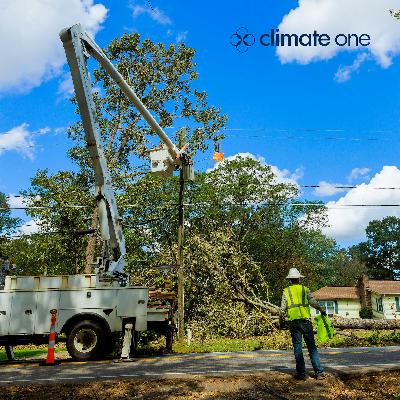
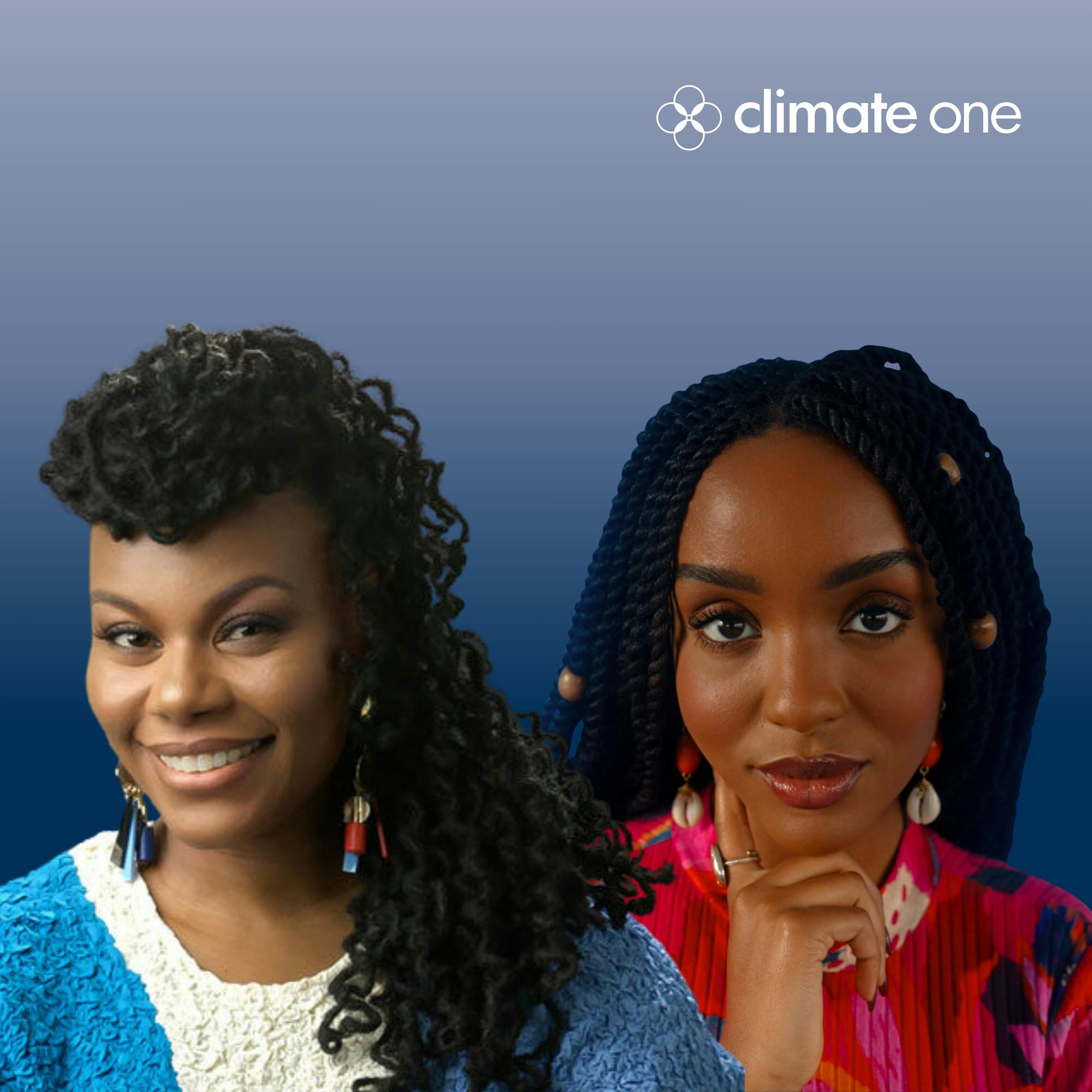

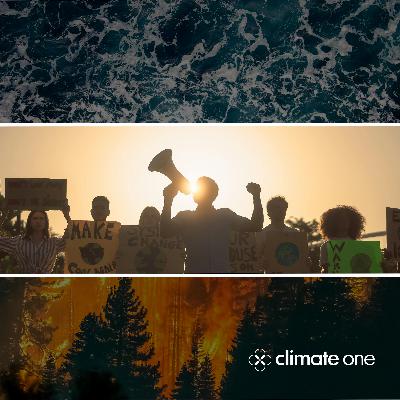

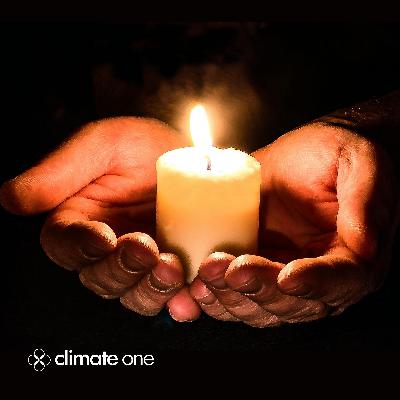
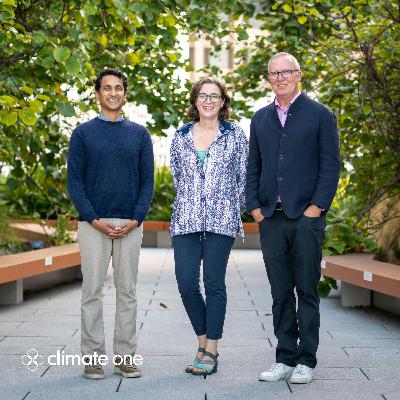
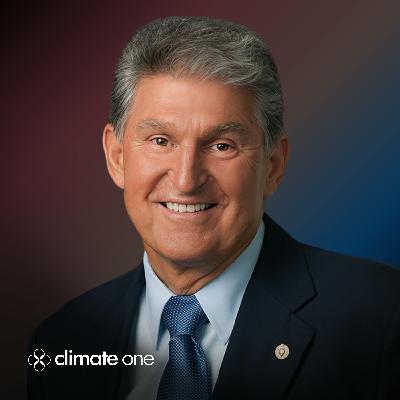
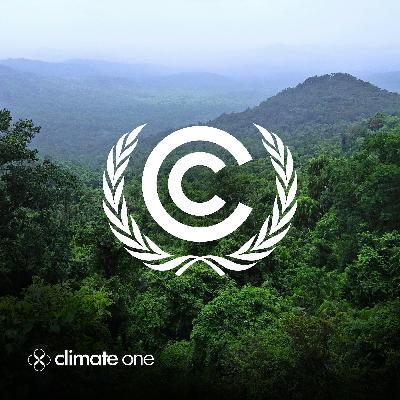
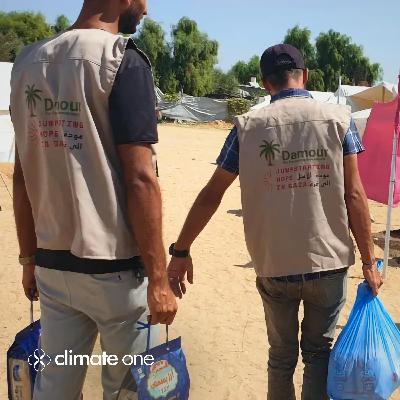
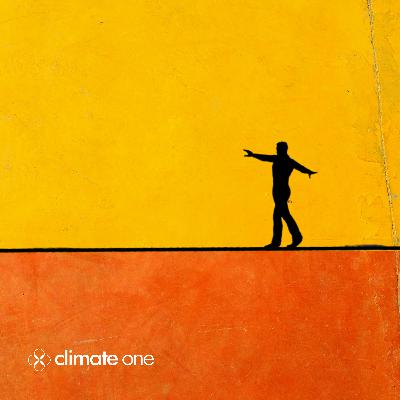

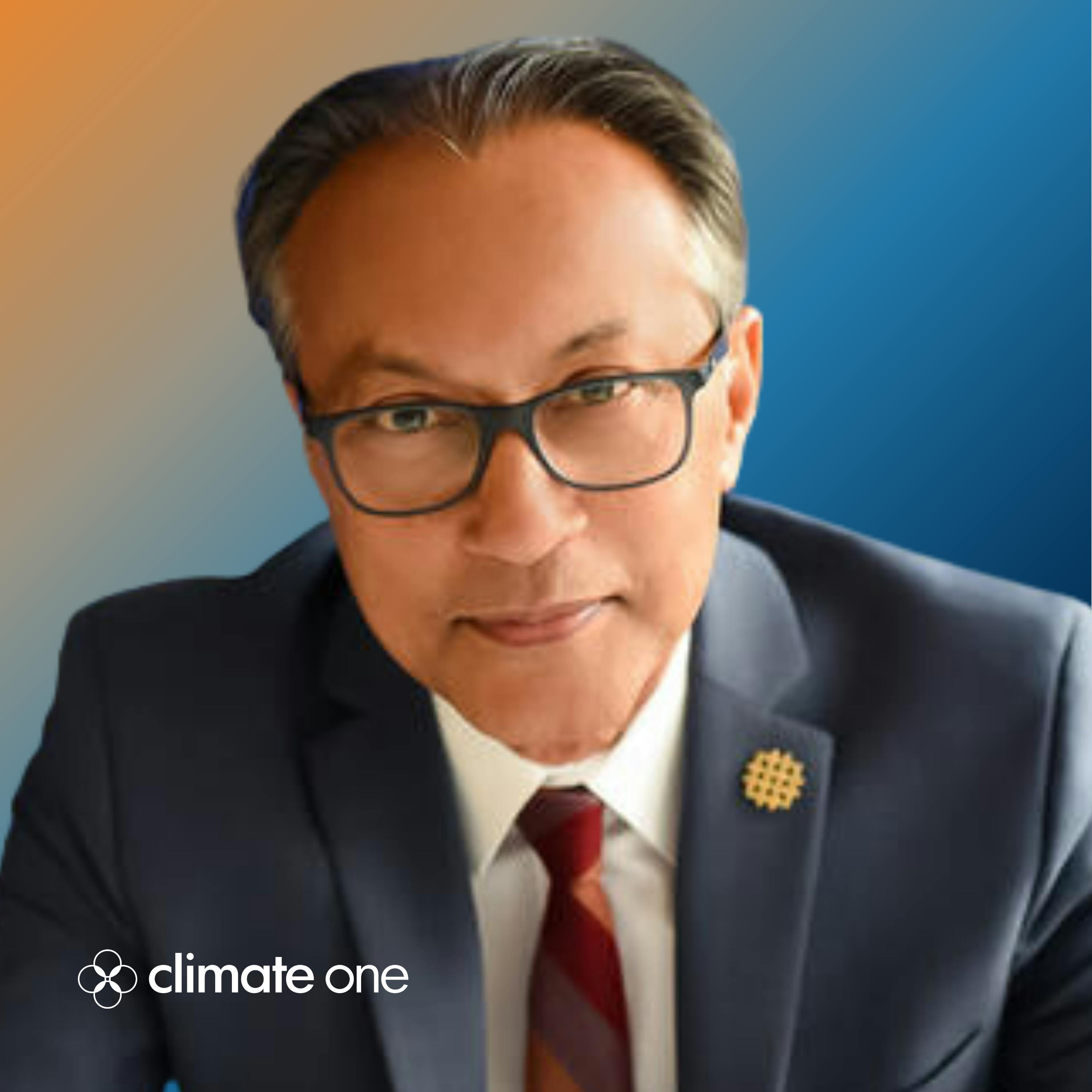
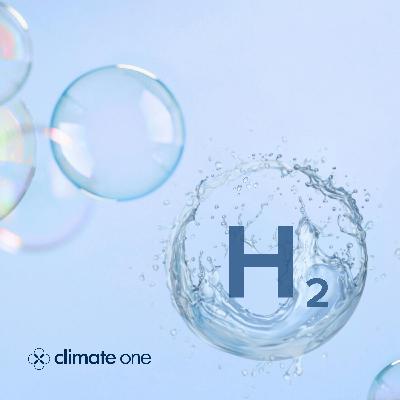






Am I to infer based on Ms. Thomas' interpretation of CRT, that any system not 100% racial synchronized is oppressive or potentially oppressive?
Great podcast for policy discussions on climate change